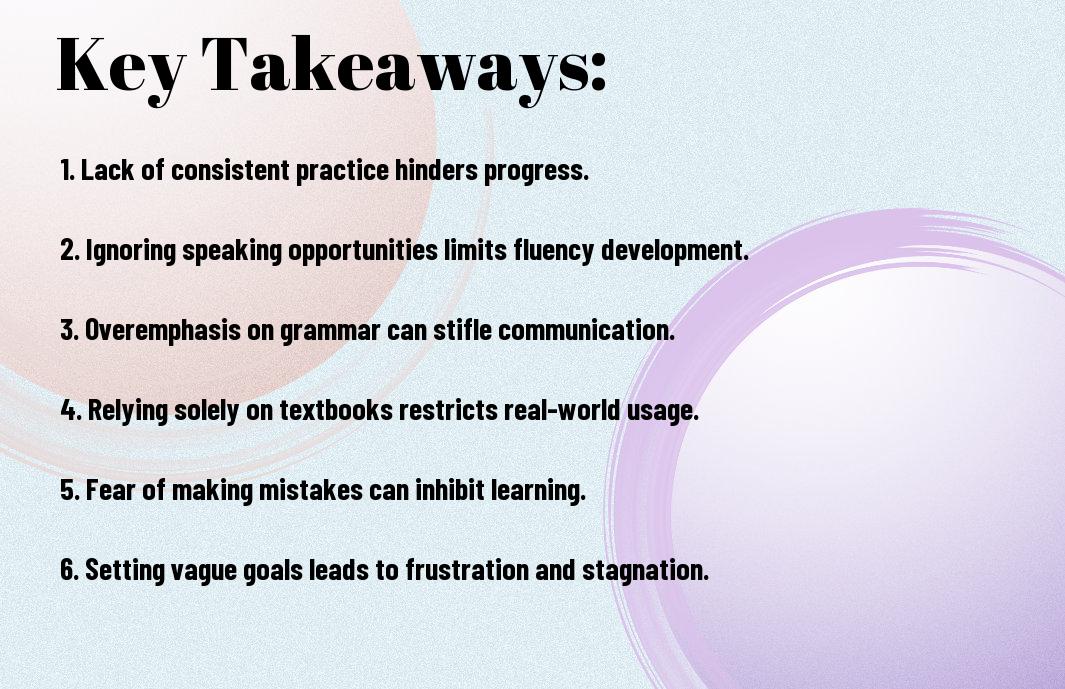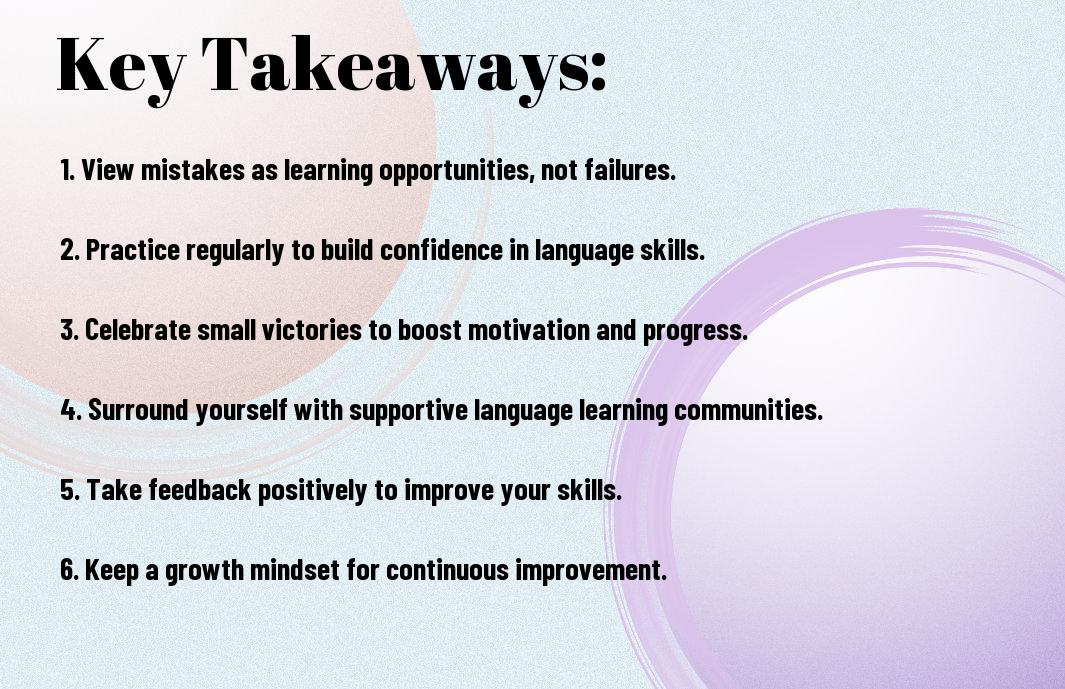As you launch on your language learning journey, you’ll inevitably encounter obstacles that hinder your progress. Your efforts to communicate effectively can be thwarted by simple, yet persistent mistakes. To avoid falling into these traps, it’s worth exploring the pitfalls that many learners face. For instance, you can find insights into 10 Common Mistakes ESL Students Make, which can serve as a cautionary guide to help you navigate the complexities of language acquisition and improve your skills more efficiently.
Key Takeaways:
The process of learning a language can be complex and nuanced, with various pitfalls that can hinder progress. Here are some key points to consider:
- Insufficient Practice is a major obstacle for many language learners, as consistent application and reinforcement are necessary for long-term retention and fluency.
- Grammar rules and exceptions can be overwhelming, but understanding the underlying structure of the language is vital for effective communication and expression.
- Focusing too much on Vocabulary acquisition without contextual understanding can lead to a lack of comprehension and application in real-world scenarios.
- Neglecting to develop Listening and Speaking skills can result in a significant imbalance in language abilities, making it difficult to engage in conversations and understand native speakers.
- Setting unrealistic Goals and expectations can lead to frustration and burnout, as language learning is a gradual process that requires patience, dedication, and persistence.
Preparation Mistakes
The path to language learning is often paved with good intentions, but poor planning can lead to frustration and stagnation. As you begin on this journey, it’s crucial to be aware of the pitfalls that can hinder your progress.
Lack of Clear Goals
Across the spectrum of language learners, a common mistake is failing to define what you want to achieve, making it difficult to focus your efforts and measure success.
Insufficient Resource Allocation
The scarcity of quality resources, such as textbooks, tutors, or language exchange partners, can severely impede your progress, leaving you struggling to find adequate support.
To effectively allocate your resources, you should prioritize your needs, considering factors like budget, time commitment, and learning style, to ensure you’re getting the most out of your language learning experience, and avoiding the frustration that comes with inadequate support, allowing you to make steady progress towards your goals.

Learning Process Errors
One of the most significant hurdles you’ll face in language learning is falling into common pitfalls. To avoid this, it’s advisable to familiarize yourself with the Top 5 Language Learning Mistakes that can hinder your progress.
Ineffective Immersion Techniques
Among the various strategies you might employ, ineffective immersion techniques can be particularly detrimental. You may find yourself struggling to make progress if your approach to immersion is flawed.
Poor Practice Habits
Techniques such as inconsistent practice and poor time management can severely impede your language learning journey. You must be diligent in your approach to practice.
In addition, your practice habits can make or break your language learning experience. You should strive to create a schedule that allows for consistent and engaging practice, incorporating a variety of activities to keep your learning fresh and exciting, and preventing the stagnation that can occur with dull, repetitive exercises, which will help you to stay motivated and make steady progress in your language learning endeavors.
Grammar and Vocabulary Mistakes
To master a language, you must pay attention to grammar and vocabulary. Your understanding of these elements will make or break your proficiency.
Common Grammar Errors
Around the time you start learning, you will notice that grammar mistakes are abundant. You will struggle with verb tenses, subject-verb agreement, and sentence structure, but practice will help you improve.
Vocabulary Building Pitfalls
Following your initial progress, you will encounter pitfalls in vocabulary building. You might find it challenging to learn new words and phrases, and your progress may slow down.
The vocabulary building process can be daunting, but you can overcome the challenges by developing a study routine and immersing yourself in the language. You should focus on learning words in context, rather than just memorizing lists of words, and engage in conversations with native speakers to improve your understanding and usage of vocabulary.

Pronunciation and Fluency Issues
Despite your best efforts, you may still struggle with pronunciation and fluency issues in your target language. This can hinder your ability to communicate effectively and undermine your confidence in speaking.
Accent and Intonation Problems
Prior to mastering the nuances of language, you will likely encounter accent and intonation problems that can significantly impact your overall pronunciation.
Fluency Practice Mistakes
Before you achieve fluency, you will need to avoid common mistakes such as speaking too slowly or hesitantly, which can impede your progress and make you feel self-conscious about your language skills.
A key aspect of overcoming fluency practice mistakes is to engage in regular, spontaneous conversations with native speakers or fellow learners, allowing you to develop your ability to think and express yourself quickly and naturally in your target language, and you will find that your fluency and confidence will improve over time with consistent practice and dedication.
Motivation and Consistency
For language learners, motivation and consistency are imperative to achieving fluency. You must find ways to maintain your enthusiasm and dedication, as these factors greatly impact your progress.
Maintaining Motivation
About the time you start learning a language, you are likely to feel a surge of excitement and motivation. You should harness this energy to set realistic goals and celebrate your achievements, no matter how small.
Consistency in Practice
Similar to motivation, drive is what propels you to practice regularly. You need to establish a routine that works for you, allowing your brain to absorb and process new information effectively.
Understanding that consistency is key to language learning, you should prioritize making practice a habitual part of your daily routine. As you progress, you will find that consistent practice helps solidify new language skills, making them feel more natural and intuitive, and this, in turn, will help you stay motivated to continue learning.
Technology and Resource Utilization
Now, as you explore into the world of language learning, you’ll encounter numerous resources, including a LinkedIn article on The Most Common Mistakes Language Learners Make and How to Avoid Them. This highlights the importance of utilizing technology effectively.
Underutilization of Language Learning Apps
Underestimating the potential of language learning apps can hinder your progress, as you may miss out on valuable practice exercises and interactive lessons that can enhance your skills.
Misuse of Online Resources
Behind the vast array of online resources lies a potential pitfall: relying too heavily on a single method, such as watching videos without engaging in speaking or writing activities, can lead to an imbalance in your language skills.
Also, as you navigate the multitude of online resources, be cautious not to waste time on defeating or old-fashioned methods that may not cater to your learning style, and instead, focus on finding a balanced approach that suits your needs and complements your learning journey.
Conclusion
Upon reflecting on your language learning journey, you will likely identify patterns of mistakes that hindered your progress. You may have prioritized grammar over vocabulary or neglected to practice speaking and listening. Your approach, though well-intentioned, may have been misdirected, leading to frustration and stagnation. By acknowledging these common pitfalls, you can adjust your strategy and forge a more effective path to language mastery, one that leverages your strengths and addresses your weaknesses with clarity and purpose.
FAQ
Q: What is the most common mistake language learners make when starting to learn a new language?
A: One of the most common mistakes language learners make is setting unrealistic goals and expecting to become fluent in a short amount of time. This can lead to frustration and disappointment when they do not see progress as quickly as they had hoped. Setting achievable goals and celebrating small milestones along the way can help to stay motivated and focused throughout the learning process.
Q: How can language learners avoid the mistake of not practicing consistently?
A: To avoid the mistake of not practicing consistently, language learners can create a schedule and stick to it, setting aside a specific time each day or week to practice speaking, writing, and listening in the target language. Additionally, using language learning apps, joining a language exchange program, or finding a language learning partner can provide accountability and help to stay on track. Consistency is key to developing language skills and making progress over time.
Q: What is the mistake of not immersing oneself in the language, and how can language learners avoid it?
A: The mistake of not immersing oneself in the language refers to not surrounding oneself with the target language as much as possible, which can limit opportunities for practice and exposure. To avoid this mistake, language learners can try watching TV shows or movies in the target language, listening to music or podcasts, reading books or articles, and speaking with native speakers as much as possible. Immersion helps to get used to the sounds, rhythms, and grammar of the language, making it easier to learn and retain new vocabulary and phrases.

